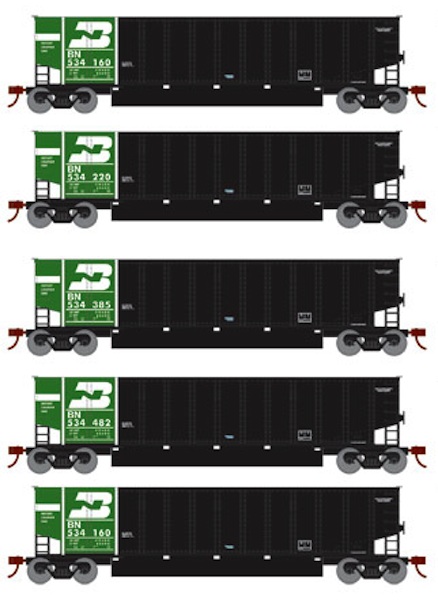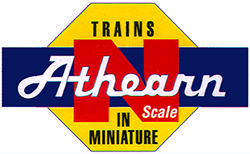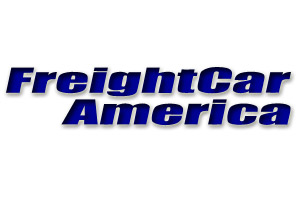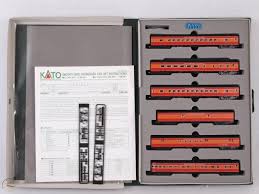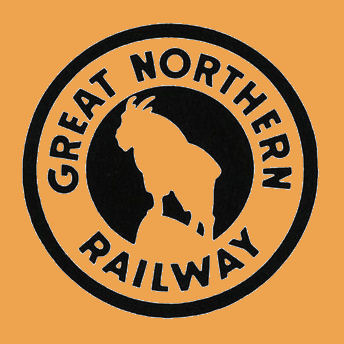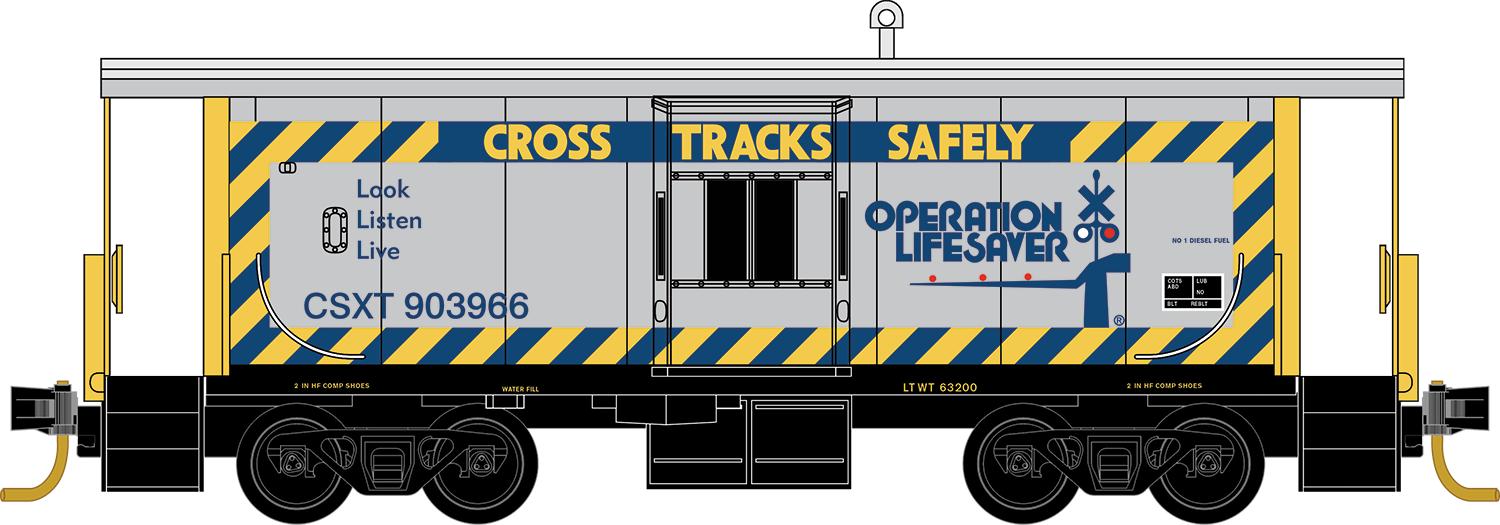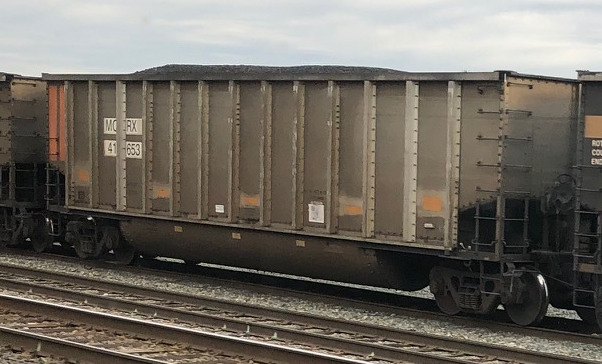Specific Item Information: part of multipack 11687
5-Pack - #s 534160, 534220, 534285, 534439, 534482
5-Pack - #s 534160, 534220, 534285, 534439, 534482
Prototype History: Since 1982, the BethGon Coalporter has been hauling "black diamonds" across the United States. The largest selling Coal Gondola in the world, the car's double tub design increases hauling capacity while reducing maintenance requirements. Tubs below the car lower the center of gravity, providing a smoother ride.
Today, coal is no longer sold at the volume it once was in the United States, and many coal carrying railroad cars have sadly been left to rust. Bethgon Coalporters could transport 44,000 pounds of these “black diamonds,” a necessity for the railroad in the era of a coal-driven country; therefore, a need of recycling these cars had to be found!
Since the use of grain for animal feed is popular for farmers in the western part of the United States, Bethgons proved up for the challenge and some were converted for use as a Protein Gondola. These covered gondolas are used in freight trains in the western and southern parts of the states in long, endless fleets providing useful feed for farm animals. Since the load of feed is biodegradable and therefore needs to be delivered as quickly as possible, trains carrying these long loads are given top priority on the rails.
Today, coal is no longer sold at the volume it once was in the United States, and many coal carrying railroad cars have sadly been left to rust. Bethgon Coalporters could transport 44,000 pounds of these “black diamonds,” a necessity for the railroad in the era of a coal-driven country; therefore, a need of recycling these cars had to be found!
Since the use of grain for animal feed is popular for farmers in the western part of the United States, Bethgons proved up for the challenge and some were converted for use as a Protein Gondola. These covered gondolas are used in freight trains in the western and southern parts of the states in long, endless fleets providing useful feed for farm animals. Since the load of feed is biodegradable and therefore needs to be delivered as quickly as possible, trains carrying these long loads are given top priority on the rails.
Road Name History: 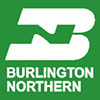 The Burlington Northern Railroad (reporting mark BN) was a United States railroad. It was a product of a March 2, 1970, merger of four major railroads - the Great Northern Railway, Northern Pacific Railway, Spokane, Portland and Seattle Railway and the Chicago, Burlington and Quincy Railroad - as well as a few small jointly owned subsidiaries owned by the four.
The Burlington Northern Railroad (reporting mark BN) was a United States railroad. It was a product of a March 2, 1970, merger of four major railroads - the Great Northern Railway, Northern Pacific Railway, Spokane, Portland and Seattle Railway and the Chicago, Burlington and Quincy Railroad - as well as a few small jointly owned subsidiaries owned by the four.
Burlington Northern operated between 1970 and 1996.
Its historical lineage begins in the earliest days of railroading with the chartering in 1848 of the Chicago and Aurora Railroad, a direct ancestor line of the Chicago, Burlington and Quincy Railroad, which lends Burlington to the names of various merger-produced successors.
Burlington Northern purchased the Atchison, Topeka and Santa Fe Railway on December 31, 1996 to form the Burlington Northern and Santa Fe Railway (later renamed BNSF Railway), which was owned by the Burlington Northern Santa Fe Corporation.*
Read more on Wikipedia.

Burlington Northern operated between 1970 and 1996.
Its historical lineage begins in the earliest days of railroading with the chartering in 1848 of the Chicago and Aurora Railroad, a direct ancestor line of the Chicago, Burlington and Quincy Railroad, which lends Burlington to the names of various merger-produced successors.
Burlington Northern purchased the Atchison, Topeka and Santa Fe Railway on December 31, 1996 to form the Burlington Northern and Santa Fe Railway (later renamed BNSF Railway), which was owned by the Burlington Northern Santa Fe Corporation.*
Read more on Wikipedia.
Brand/Importer Information: Athearn's history began in 1938, when its founder-to-be, Irvin Athearn, started an elaborate O scale layout in his mother's house. After placing an ad selling the layout, and receiving much response to it, Irv decided that selling model railroads would be a good living. He sold train products out of his mother's house through most of the 1940s. After becoming a full-time retailer in 1946, Irv opened a separate facility in Hawthorne, California in 1948, and that same year he branched into HO scale models for the first time.
Athearn acquired the Globe Models product line and improved upon it, introducing a comprehensive array of locomotive, passenger and freight car models. Improvements included all-wheel drive and electrical contact. One innovation was the "Hi-Fi" drive mechanism, employing small rubber bands to transfer motion from the motor spindle to the axles. Another was the double-ended ring magnet motor, which permitted easy connection to all-wheel-drive assemblies. Athearn was also able to incorporate flywheels into double-ended drives.
The company produced a model of the Boston & Maine P4 class Pacific steam locomotive which incorporated a cast zinc alloy base and thermoplastic resin superstructure. It had a worm drive and all power pickup was through the bipolar trucks that carried the tender. This item was discontinued after the Wilson motor was no longer available, and was not redesigned for a more technologically advanced motor.
Athearn's car fleet included shorter-than-scale interpretations of passenger cars of Southern Pacific and Atchison, Topeka & Santa Fe Railroad prototypes. The company also offered a variety of scale-length freight cars with sprung and equalized trucks. The cars could be obtained in simple kit form, or ready-to-run in windowed display boxes. The comprehensive scope of the product line contributed to the popularity of HO as a model railroad scale, due to the ready availability of items and their low cost.
Irv Athearn died in 1991. New owners took control in 1994, but continued to follow Athearn's commitment to high-quality products at reasonable prices. Athearn was bought in 2004 by Horizon Hobby. Athearn was then moved from its facility in Compton to a new facility in Carson, California. In mid-2009, all remaining US production was moved to China and warehousing moved to parent Horizon Hobby. Sales and product development was relocated to a smaller facility in Long Beach, California.
Read more on Wikipedia and Athearn website.
Athearn acquired the Globe Models product line and improved upon it, introducing a comprehensive array of locomotive, passenger and freight car models. Improvements included all-wheel drive and electrical contact. One innovation was the "Hi-Fi" drive mechanism, employing small rubber bands to transfer motion from the motor spindle to the axles. Another was the double-ended ring magnet motor, which permitted easy connection to all-wheel-drive assemblies. Athearn was also able to incorporate flywheels into double-ended drives.
The company produced a model of the Boston & Maine P4 class Pacific steam locomotive which incorporated a cast zinc alloy base and thermoplastic resin superstructure. It had a worm drive and all power pickup was through the bipolar trucks that carried the tender. This item was discontinued after the Wilson motor was no longer available, and was not redesigned for a more technologically advanced motor.
Athearn's car fleet included shorter-than-scale interpretations of passenger cars of Southern Pacific and Atchison, Topeka & Santa Fe Railroad prototypes. The company also offered a variety of scale-length freight cars with sprung and equalized trucks. The cars could be obtained in simple kit form, or ready-to-run in windowed display boxes. The comprehensive scope of the product line contributed to the popularity of HO as a model railroad scale, due to the ready availability of items and their low cost.
Irv Athearn died in 1991. New owners took control in 1994, but continued to follow Athearn's commitment to high-quality products at reasonable prices. Athearn was bought in 2004 by Horizon Hobby. Athearn was then moved from its facility in Compton to a new facility in Carson, California. In mid-2009, all remaining US production was moved to China and warehousing moved to parent Horizon Hobby. Sales and product development was relocated to a smaller facility in Long Beach, California.
Read more on Wikipedia and Athearn website.
Item created by: Powderman on 2018-01-06 16:55:55
If you see errors or missing data in this entry, please feel free to log in and edit it. Anyone with a Gmail account can log in instantly.
If you see errors or missing data in this entry, please feel free to log in and edit it. Anyone with a Gmail account can log in instantly.


